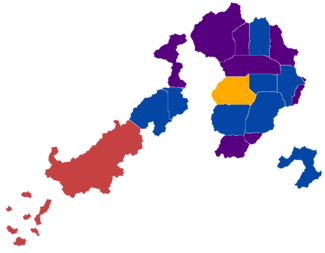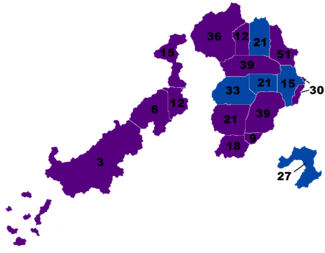2013 Tevitheimer Grand Chancellery Election
| |||||||||||||||||||||||||||||
408 members of the Electoral Council 205 votes needed to win | |||||||||||||||||||||||||||||
|---|---|---|---|---|---|---|---|---|---|---|---|---|---|---|---|---|---|---|---|---|---|---|---|---|---|---|---|---|---|
| Registered | 136,118,085 ( | ||||||||||||||||||||||||||||
| Turnout | 111,317,370 (81.8%) ( 109,397,374 (80.8%) ( | ||||||||||||||||||||||||||||
| |||||||||||||||||||||||||||||
Map of jarldoms by first-place winner: Purple indicates jarldoms won by Raimundo/Landser. Dark blue indicates jarldoms won by Flaas/Horvator. Red indicates jarldoms won by Clinton/Vultersen. Orange indicates jarldoms won by Milsersen/Long.
| |||||||||||||||||||||||||||||
| |||||||||||||||||||||||||||||
The 2013 Tevitheimer Grand Chancellery Election was the ninth sext ennial grand chancellery election in Tevitheim. The election consisted of two rounds. The first, held on 6 August, saw a total of six major candidates garner electoral votes. As no candidate garnered a majority of electoral votes required, a runoff election would be held among the top two tickets; incumbent grand chancellor Aud Raimundo and vice chancellor Mikkel Landser and former Chancellor for Foreign Affairs from Måkeøyene Glenn Flaas and Alnatingsrepresentant Karl Horvator of Jomfra on 27 August. Raimundo and Landser would win the election by a landslide.
Raimundo had been serving as President of the Alnating during the Duraksen chancellery through the course of the vote-buying scandal that led to the removal of Duraksen from office on 11 July 2012. As Vice Chancellor Teo Norens had had resigned from office due to health reasons in May the grand chancellery passed to the next in the line of succession, Raimundo. As Raimundo had served less than 3 years of Duraksen's term, she was eligible to run for a full term in her own right. This makes Raimundo one of the only two incumbent grand chancellors to ever be eligible to run while in office, alongside Wade Mannerheim, though Mannerheim refused to run.
In the first round no candidate took a majority of electoral votes. Raimundo came in first place with 117 electoral votes and 28.6% of the popular vote. Social Union candidate Glenn Flaas took 109 votes and 26.3%, Republican Edward Clinton took 84 votes and 20.0% of the vote, Liberal Democrat Markus Milsersen took 71 votes and 17.2%, National Jens Larssen received 14 votes and 3.3%, and finally Worker's nominee Hortik Ulcher took 13 votes and 2.8% of the popular vote. As no candidate received the 205 electoral votes required for victory the two top candidates, Raimundo and Flaas, advanced to the second round.
In the second round Raimundo would win by a landslide, receiving 291 electoral votes and 55.3% of the popular vote, beating Flaas by a margin of 10.6%, or 11.6 million votes. This marks the only electoral victory by a party not the Social Union or Republicans in a general election (though Liberal Democratic candidate Paal Zhang won the 2001 election in the contingent election). Despite hopes of the Progressive-Greens supplanting the Republicans as the primary left-wing party in Tevitheim, the Progressive-Greens would lose their Alnating majority by 2016.
Electoral System
Under Article 2 of the Constitution of Tevitheim, the grand chancellor is elected to a six-year term in an indirect election. Voters vote for slates of electors, who then elect the grand chancellor. Electors are distributed by population, with the smallest jarldom receiving three votes and all others receiving votes in proportion to their relative populations compared to the smallest jarldom. In 2019 the smallest jarldom were the combined Territories, which received three votes. The largest was Hellighjerte, which received 54 votes.
If no candidate secures an absolute majority of electoral votes in the first round, a second round is held three weeks later between the two candidates who received the most votes. According to the Constitution of Tevitheim, the first round of the grand chancellery election must be held on the first Tuesday of August, with the second round to be held exactly three weeks later. The winner of the election then takes office the first Tuesday after the first Monday of November, giving roughly two months for a candidate to negotiate coalitions and prepare to assume office.
Electoral votes are distributed through a wide variety of methods in the first round, but due to Tevitheim's fractured political stage it is unlikely any candidate secures a first round victory in most elections. The second round is distributed winner-take-all per each jarldom. However, after the 2001 election saw Aleksander Goreson win the grand chancellery despite Jonas Støre winning the popular vote, several jarldoms have agreed to distribute their electors to the winner of the national popular vote. A total of six jarldoms had signed on by 2013 and had a collective bloc of 204 votes. While this technically allowed for a tie election in the electoral college, the fractured political scene of Tevitheim all but ensured that the winner of the popular vote would win the grand chancellery. However, due to Raimundo's overwhelming victory, no jarldoms that were a part of the agreement were won by Flaas.




